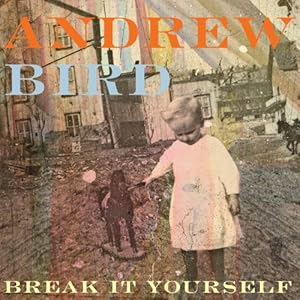Over the past four to six years there has been a steady rise in “Indie” music. This term is technically shorthand for any music released on an independent label. These smaller labels are numerous and almost never heard about unless they have a few stellar artists. Even then, their budgets seem like a raindrop in the deluge that is a major label’s finances. In this period of time I have steadily grown to enjoy these lesser-heard bands and artists. I’m never trying to be cooler than the mainstream, nor do I think I am above bands that get significant radio play. The music is better.
I enjoy the hunt for these bands and records. I enjoy the looks I get in Barnes & Noble when I ask about The Boy Least Likely To, Ghostface Killah, MF Doom, Neutral Milk Hotel, Band of Horses, and Tapes ‘N Tapes. No matter whom I ask, the response is always the same: “who/what? Could you repeat that? Is that the band or the album?” This is equal parts frustrating and amusing. It gives me a weird sense of pride that I’m not just another John or Jane looking for the latest U2 or Kelly Clarkson disc. This pride comes from the idea that, with indie music, I share a secret with a smaller society of music geek. And let’s face it, that’s what I am and huge Music Geek.
I enjoy the music more than the growing culture of Indie. It’s cool to be anti-mainstream in some regards. I’m mainstream in almost every facet of my life except for the music I enjoy the most. I’m content with this. I seek out new sounds that have been deemed, for one reason or another, “not ready for radio consumption.” The indie culture can have a better-than-thou attitude that doesn’t align with my morals. I would actually prefer to educate more people about this music I covet and track like a groupie. If I could teach every Coldplay-lover about The Go! Team I’d feel, in a way, like I was educating the masses. But on the flip side, they would no longer be “mine.” That’s my main problem: when indie goes popular.
The progression of the rare few indie bands that become mainstream generally follow the same path. The band starts out small, works their way up by touring tirelessly, word-of-mouth, and small pieces of press. At which point, the press builds and builds until they have a feature article in Rolling Stone or Q (the best UK music magazine). This string of events strips away the “indie” from the band and it becomes (now) alternative or even pop. More people knowing nets the band more exposure and more money. In most cases they get a new record deal and have to conform to what the label wants so their subsequent albums are never quite as good or original. Pop music is too polished. Too clean. Too produced. The raw energy and brash production makes me feel like they are actually making music. In pop they aren’t making music, they’re making something that is metaphorically washed, re-washed, tumbled dry, hung, ironed, dry-cleaned, and plastic wrapped. All for the (growing) unreasonable price of $15.
I’m convinced this steady rise and changes have all come about with the advent of the Internet. A band no longer has to rely on print media to get noticed. There is so much self-promotion that can occur on a scant budget. The innumerable resources now available for making, recording, producing, and distributing, et al. are all at one’s fingertips. The idea that music would be so easy to get via downloads (illegally or service provided) was unfathomable just a few years ago.
I deem the rise of indie as a progression in the course of pop music and culture. The vast array of new music that is being made and is readily available has been given more and more notice. The concept of “indie” is now a known commodity and bigger labels are starting to take notice whether by signing some of these lesser-heard bands or by buying their smaller label just to make some more money. Although some of my favorites might become more popular or mainstream over the next few years at least I can say that I heard them before anyone else.
Friday, March 31, 2006
Indie to Pop
Posted by
ethan a. zimman
at
10:22 AM
0
comments
![]()
Folded Chips
If you’ve ever seen me eat potato chips you may think discrimination abounds in my everyday life. I subconsciously (and consciously) separate chips into two categories: “normal” and “folded.” These folded chips are the ones that look as if the circle of the chip has been flipped in half onto itself. For some reason it’s more fun to eat the folded ones. I save them for last. They have more crunch to them, and thus are more satisfying to eat.
A friend once inquired why I did this after she noticed that I was “playing favorites” with the chips. We went on to have a philosophical debate about my chip profiling. I tried to explain that it was just a quirky eating habit. I also qualified my response with the idea that I find it weird to eat Pringles because they are all the same. They’re like what would’ve happened had Hitler had his way with the world: a master race of potato chips. On the other hand, she thought that maybe it spoke to a larger idea that I was a very biased person in other aspects of my life. I thought that this was possible, but maybe I was less conscious about larger things than various chips.
I explained to her that the folded chips were more interesting. They have more personality. At this point in time, if she didn’t know me, she would have got up from the table and told me that I was crazy. The folded chips had to get that way some how, right? The unfolded ones took the normal path to Chiphood. They were cut from the potato and deep-fried, end of story. The folded ones could have been unfolded at one point and therefore got their uniqueness during a phase of their conception. Other unfolded chips bullied them around; pressured them into changing, or just got caught at the bottom of the crate and folded under the weight of the others. I wanted to give time to the possibilities of the folded chips’ stories.
I don’t persecute others nor do I make insensitive derogatory comments. I treat people equally and with respect. Unfortunately I can’t say the same for the way I eat chips. The folded ones end up having a slightly longer life than the regular ones.
Posted by
ethan a. zimman
at
10:20 AM
1 comments
![]()
Monday, March 27, 2006
Sorry Joey I'm Docking Your Grade Because You're An Asshole
I’ve never gotten a paper back from a professor that says, “your writing is exceptional, but I’ve heard of your obnoxious white-male patriarchal bullshit, so in light of that I’m giving you a C-.” My experiences have taught me that learning in college isn’t only about textbooks. On the contrary, there is a greater scope to college learning that includes developing and shaping personal character, which is why professors should care about their students’ character even though it’s not in their job description.
Character takes many variable forms. In general, certain traits or habits can be associated with “good” or “bad” character. People usually tend toward one side of the Character Spectrum. I believe, for the sake of argument, that a student with good character is also a scholarly one who’s studious, courteous, comes to class, participates in class, turns in assignments, asks questions, is receptive to criticism, and genuinely wants to learn. In contrast, a good indicator of character tending to the Bad Side is a kid that half-asses pretty much everything, walks into a 90-minute class 30 minutes late as if nothing is wrong, falls asleep in class consistently, gives more excuses than punctual work, and is the first out of the room even when they’re the furthest from the door. It’s troublesome for a professor to know if a student is doing certain things because they care more about learning or more about their grade. These various actions often sway the thoughts of a professor.
A professor’s character is equally hard to judge. I’ve found the best professors challenge their students intellectually, figure out ways to connect with them individually and have enough charisma that students rarely hit the Mute button. There's something in those great professors that makes the students want to excel. I’ve been lucky enough to have a few professors like this. I feel the need to give 100%, 100% of the time for their class. I want to impress them, show them I care, that they’re great at their job, and that I appreciate everything they do. Character is a funny thing because it’s extraordinarily subjective. I’ve had a couple professors whom I wanted to tell that they couldn’t teach their way out of a paper bag. Except, this assessment of their teaching isn’t a measure of whether they’re a good person. I’d like to think that the great professors are of great character, but what they’re like outside of the classroom goes mostly unknown.
Why does character matter? Does it matter? Do I wish all my professors were pot-smoking-drunks? Would it be entertaining? Would I learn how to make a beer can into a bong? Would we even have class? Would the term “class” be replaced with “chill time”? Should a professor care if a student is an asshole if they produce “A” work? Should a professor care if a student litters, speeds, swears, smokes, does drugs, and drinks? Should a student care if a professor does any of those things?
Where do grades and character cross? It’s entirely possible that a student is “book-smart” and does extremely well on their report card but is a complete jerk and doesn’t care about their course at all. In turn, there are plenty of students that slip on turning things in on time and don’t have a 3.87 GPA, but take enormous interest in their classes, and are some of the best individuals around. Grading shouldn’t be contingent on character, but shouldn’t a person with better character be rewarded somehow? I soothe my psyche by assuming a professor would rather have great kids in their classes who foster interesting conversation than a bunch of one-dimensional workaholics that can’t see beyond their GPA.
The problem with professors caring about students’ character is that something so subjective is dependant on their own character. Does being a professor automatically make them a perfect judge of character? I tend to doubt it, because everyone likes to think they’re the best judge of character this side of the heavenly gates. It’s the same for students though. Just because you can’t believe any institution of higher learning would tenure such an imbecile, doesn’t mean the professor goes home at night and downloads child porn. On the other hand, professors should care about their students’ character and set an example for them because it’s a reflection of not only themselves but also their institution.
Good or bad character isn’t taught, nor can it be changed overnight. There isn’t much a professor can do to build good character in their students besides setting a superior example. Their character affects my respect for them, in and out of the classroom. Likewise students should be free to explore personal growth and learning without the worry their next grade is going to reflect their character development. Overall, I care whether or not my professor is a sleezeball. I just do.
Posted by
ethan a. zimman
at
12:43 PM
1 comments
![]()







